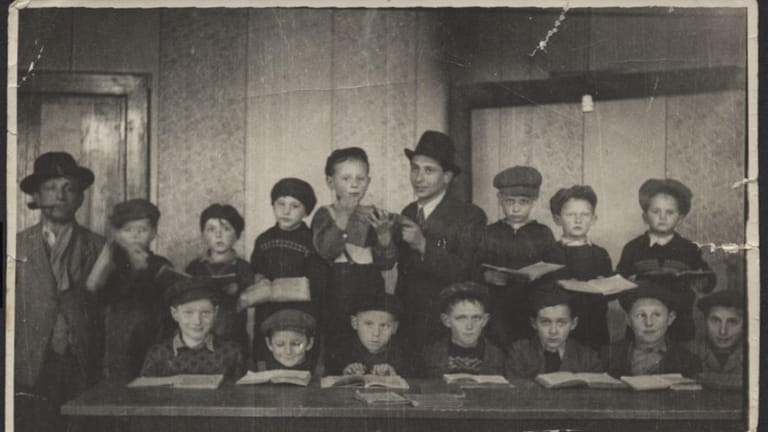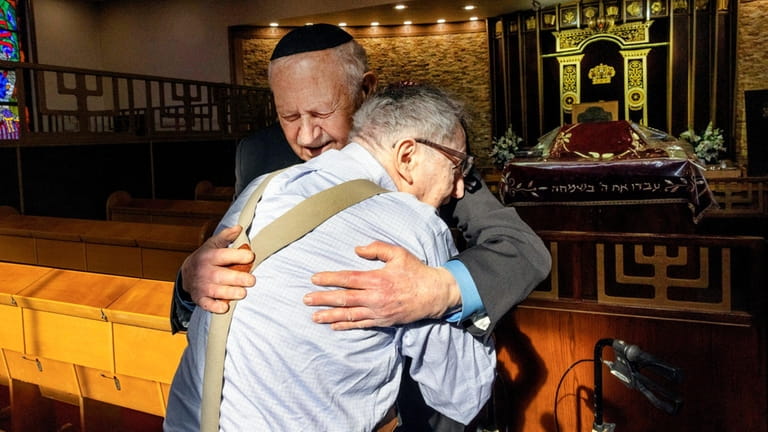Holocaust survivors meet again at New Hyde Park synagogue, reunited after more than 70 years

They were just children when they first met in a displaced persons camp for Holocaust survivors in Germany after the end of World War II, losing touch over the decades until Sunday when, now, as grandparents, the three were reunited through a photograph from about 76 years ago.
“That’s the miracle of continuity, of not giving up and survival,” said Abe Rosenberg, 82, of Queens, one of the Holocaust survivors who organized the reunion at his synagogue, Young Israel of New Hyde Park in Queens.
Rosenberg and his sister, Ada Gracin, 87, of Melville, met Michael Epstein, 87, of Fair Lawn, New Jersey, for the first time since the two families left the Feldafing displaced persons camp, a former summer camp for Hitler Youth that became a temporary shelter for Jewish survivors after the end of the war. They were included in black-and-white photos of the camp residents. Both families left the camp in 1949.

The photo of residents of a displaced persons camp in Germany after World War II that led to a reunion of three people, now grandparents, who lived at the camp. The little boy to the left of the teacher in the back row is Abe Rosenberg, and second from right in the front row is Michael Epstein. A third survivor, Ada Gracin, is not pictured. Credit: Abraham Rosenberg
Over bagels and lox, the survivors shared stories of their lives with about 100 people Sunday in an occasion to celebrate not just surviving, but thriving, as one speaker put it.
WHAT TO KNOW
- Three Holocaust survivors met Sunday for the first time since they were children living in a displaced persons camp in Germany after World War II.
- They were reunited three quarters of a century later by a photograph.
- Taken in 1947 or 1948, the photo captured the two boys, now grandfathers, in class. The two families lost touch over the decades until a filmmaker with the educational project the men participated in made the connection.
“This is a great country that we live in,” said Epstein after he recounted his journey that took him from his birth country of Poland, to Siberia, to Uzbekistan, back to Poland, then Germany and finally the U.S. in 1949.
Much of the survivors’ memories centered on the camp where the Jewish families rebuilt life.
Gracin, a mother of three and grandmother of six, remembered the austere barracks they lived in and the powdered milk. At the age of 9 when the family moved into the camp in late 1945, Gracin for the first time went to school, made friends, played and laughed.
“Although we lacked many things, I never felt deprived,” she told the crowd Sunday. “The survivors cherished each child as if they were theirs. We were precious jewels to them as many had lost their own children. I felt comforted to have my small family together. No more fear of being separated. No more fear of my parents being arrested.”
She called this period, from late 1945 to early 1949, “life reborn.”
In the late 1940s, thousands lived at the camp and the two men, then boys, didn’t remember each other. But their shared years there were captured in photos.
One, in particular, brought them together.

Holocaust survivors Abe Rosenberg, 82, left, and Michael Epstein, 87, meet in New Hyde Park in Queens Sunday seven decades after they were children at a displaced persons camp in Germany. Rosenberg's sister Ada Gracin, 87, another Holocaust survivor, was also there at Young Israel of New Hyde Park. Credit: Debbie Egan-Chin
The photo, which Rosenberg estimated to be taken in 1947 or 1948, shows 14 boys in class led by Rabbi Meir Katz seen at the center. Rosenberg reconnected with Katz in Brooklyn in late 1990s after publishing an essay he wrote in Algemeiner Journal, a newspaper that Katz read. Katz died a few months ago at 96, Rosenberg said.
Epstein and Rosenberg both participated in "Names, Not Numbers," a Holocaust oral history film documentary project created by Tova Rosenberg.
The two men were separately interviewed on camera by students when they made school visits and Adam Chinoy, a filmmaker with the project, recognized the same photo they used to show the students. Chinoy told Newsday in a phone interview he only saw Rosenberg in the videos he edited but met Epstein in person.
Upon hearing of another survivor, Epstein contacted the school where the videos were taped and found his classmate, about 76 years after the photo was taken.
Over the seven decades, the two men had unknowingly crossed paths.
The two families immigrated to the U.S. within a month of each other in 1949. The Epsteins arrived in the Bronx and the Rosenbergs came to Brooklyn. They both studied electrical engineering at the same college — the City College of New York. They even worked at the same company, Bendix in Teterboro, New Jersey, when Rosenberg spent two years in the 1960s there.
“It's a miracle,” Epstein said before the event. “It's unbelievable actually. Not only the connection, but also that we went to [the same college], we worked together without knowing each other and we each have nice families.”
The only child of Joseph and Anna Epstein, who died in 1985, Epstein has three children, 11 grandchildren and five great-grandchildren. Rosenberg has two children and five granddaughters. The parents of Abe Rosenberg and Gracin, Jacob and Mania (Miriam) Rosenberg, died in 1966 and 2003 respectively.
Epstein’s granddaughter Avigayil Geller, of Fair Lawn, New Jersey, said the reunion carried more emotional weight because its roots were in Epstein and Rosenberg’s efforts to educate the younger generation. If they didn’t participate in the educational project, the filmmaker wouldn’t have made the connection.
“My grandfather doesn't have any family other than his parents and one cousin who survived the Holocaust,” she said. “By creating awareness and sharing his story, he's able to reconnect with people [he knew back then]. … It's really meaningful to see that."

